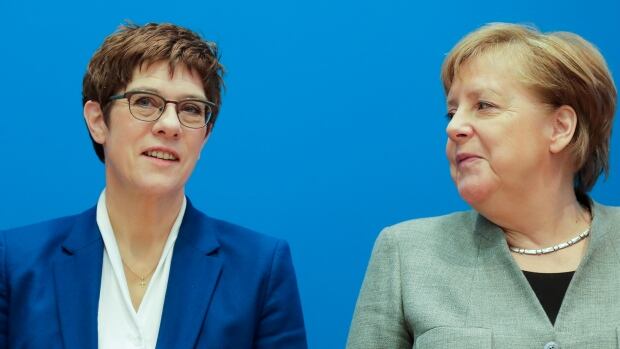Angela Merkel's would-be successor in Germany is resigning instead

German Chancellor Angela Merkel’s designated successor unexpectedly threw in the towel Monday, plunging her conservative party into deeper crisis as it struggles to agree on its future political direction after losing votes to the far right.
Annegret Kramp-Karrenbauer told leading members of the Christian Democratic Union that she won’t be seeking the chancellorship in next year’s election, upending Merkel’s plans to hand her the reins after more than 15 years in power.
Merkel’s spokesperson Steffen Seibert told reporters in Berlin that Germany’s long-time leader stood by her decision not to run for a fifth term in 2021, despite the latest development.
Kramp-Karrenbauer’s decision not to run for chancellor leaves a big question mark over Germany’s future direction just as its economy, the world’s fourth largest, flirts with recession and as the European Union struggles to define itself after Brexit.
The announcement reflects the growing split within the Christian Democrats that was exposed last week in its handling of the election of a governor in the state of Thuringia. Regional party lawmakers there voted with the far-right Alternative for Germany party (AfD) to oust the left-wing incumbent, ignoring advice from Berlin leadership.
The move broke what is widely regarded as a taboo in post-war German politics around co-operating with extremist parties.
Kramp-Karrenbauer is still Germany’s defence minister.
Tenuous coalition
It was unclear how the latest developments would affect Merkel’s earlier plans for her succession. A shift to the right in Merkel’s centre-right party could trigger a break with Merkel’s junior coalition partners in Germany’s federal government, the centre-left Social Democrats, and increase the chances the country will hold the next general election early.
Among the names currently being bandied around as future party leaders were Health Minister Jens Spahn and Friedrich Merz, who were beaten to the leadership by Kramp-Karrenbauer in December 2018. Armin Laschet, the governor of North Rhine-Westphalia, Germany’s most populous state, is also being mentioned as a possible contender.
While Spahn and Laschet are considered centrists in the Merkel tradition, Merz has tried to appeal to the conservative wing of the party that has flirted with the far-right AfD. A lawyer and former party veteran, Merz was sidelined by Merkel before she became chancellor in 2005.
The far-right Alternative for Germany party welcomed Kramp-Karrenbauer’s resignation, as did Germany’s former domestic intelligence chief, Hans-Georg Maassen, a vocal figure on the right of Merkel’s party since his ouster in 2018.
Peter Altmaier, Germany’s economy minister and a close Merkel ally, said the Christian Democrats were in “an unusually serious situation.”
Current polls have Merkel’s conservative block holding steady at about 28 per cent support nationally, followed by the left-leaning Greens at about 22 per cent.
Yet the Social Democrats are struggling with only about 14 per cent support, about the same as the AfD.
Kramp-Karrenbauer, 57, won a vote in December 2018 to succeed Merkel as CDU leader, though many remained unconvinced of her leadership credentials.
The far-right scandal in Thuringia proved to be the last straw, but her ratings plummeted last year after a number of public gaffes, including poking fun at transgender people in what was supposed to be a light-hearted speech at a carnival.

